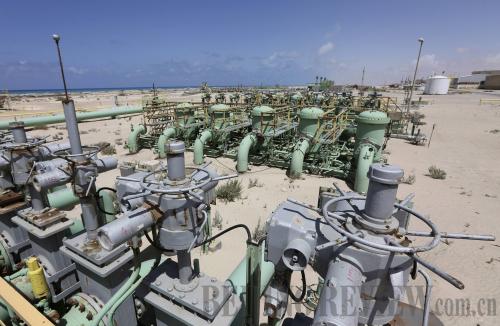|
 |
|
LIFELINE FOR MANY: A general view of pipelines at the Zueitina oil terminal in Zueitina, west of Benghazi, Libya, on April 7 (CFP) |

Whereas most primary commodities have dropped drastically in price, crude oil remains as much as $100 per barrel. It is in effect a result of manipulative actions and is unlikely to be sustained over the long term.
The Organization of Petroleum Exporting Countries (OPEC) has been driving the high oil prices through manipulative behaviors such as limiting oil production quotas. With the current pricing mechanism, oil is only partially affected by the relationship of supply and demand. Despite the regime change in Egypt and factional conflicts over Libyan oil fields, instability in the world's most oil-rich region has little to do with today's high energy prices.
Market factors
Supply-demand dynamics and changes in monetary policies have weakened the foundation of oil price spikes. Moreover, the shortage of global oil market supplies has been greatly alleviated since 2012 due to several factors.
Global economic growth on the whole has slowed down, leading to reduced demand for oil. In particular, the growth of emerging economies—which account for a significant proportion of energy consumption—has decelerated remarkably, including China. In the previous 10 years, speculators frequently argued that Chinese demand was the strongest source of rising oil prices.
Reforming the nature of energy subsidies will further weaken demand for oil. In recent years, energy consumption growth in many countries has been based on unreasonably high energy subsidies, especially in emerging economies. These policies come with heavy burdens on the financial health of these countries. The International Monetary Fund (IMF) estimated in its report, Energy Subsidy Reform: Lessons and Implications, in 2013 that global energy subsidies totaled $1.9 trillion, accounting for 8 percent of all government revenues. Under such circumstances, due to slowing economic growth and mounting financial pressures, many countries will take measures to reduce or cancel energy subsidies, thereby weakening energy demands.
The unrelenting high oil price promotes the development of alternative energy resources including natural gas, nuclear energy, hydroelectricity, solar and wind energy. For example, although China's oil consumption has increased in the last decade, its proportion of all energy consumption reduced from 22.2 percent in 2000 to 18 percent last year.
High prices have led to large-scale investment in oil exploitation in new areas, such as Sub-Saharan Africa, North America and Latin America. Particularly, innovations in shale oil and gas usage by the United States have brought a revolutionary impact on the energy industry. There is now a strong possibility that increased oil production could drive down the price of oil.
Changes in major economies' monetary policies have also affected oil prices drastically. Quantitative easing by the United States previously offered robust support for rising oil prices. However, the Federal Reserve may reduce or cancel the policy, which could lead to a bear market in primary commodities—including oil.
| 